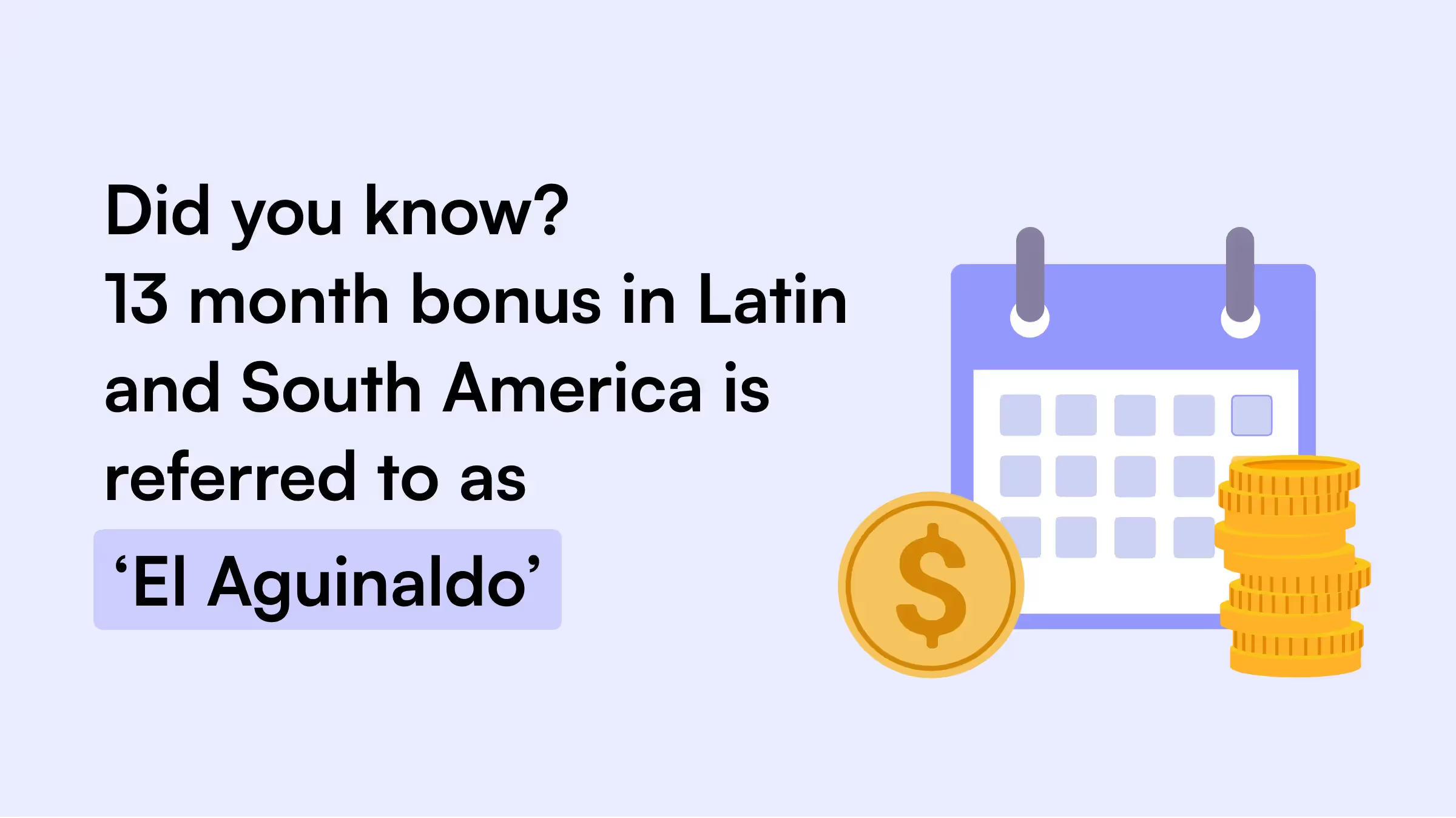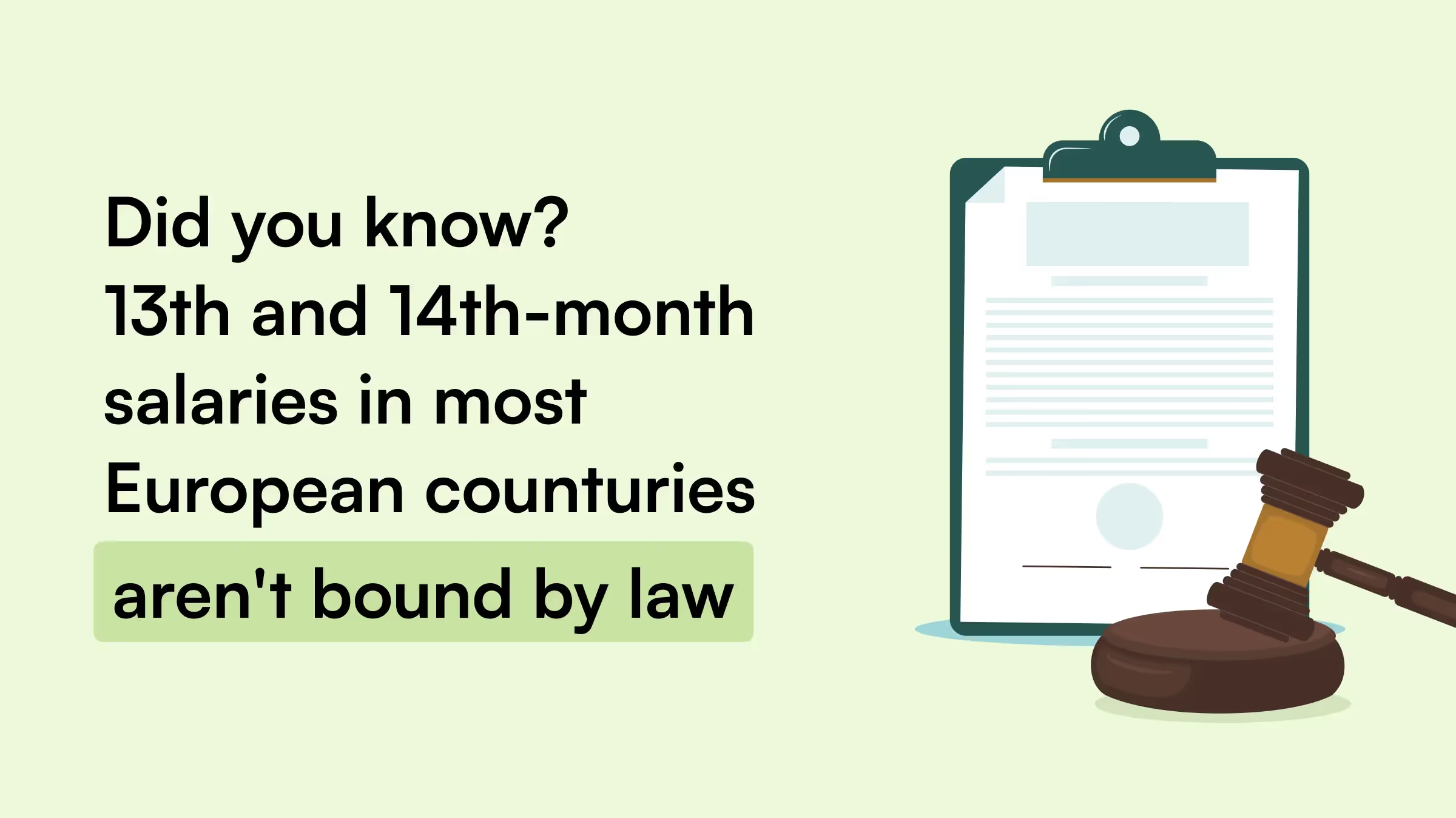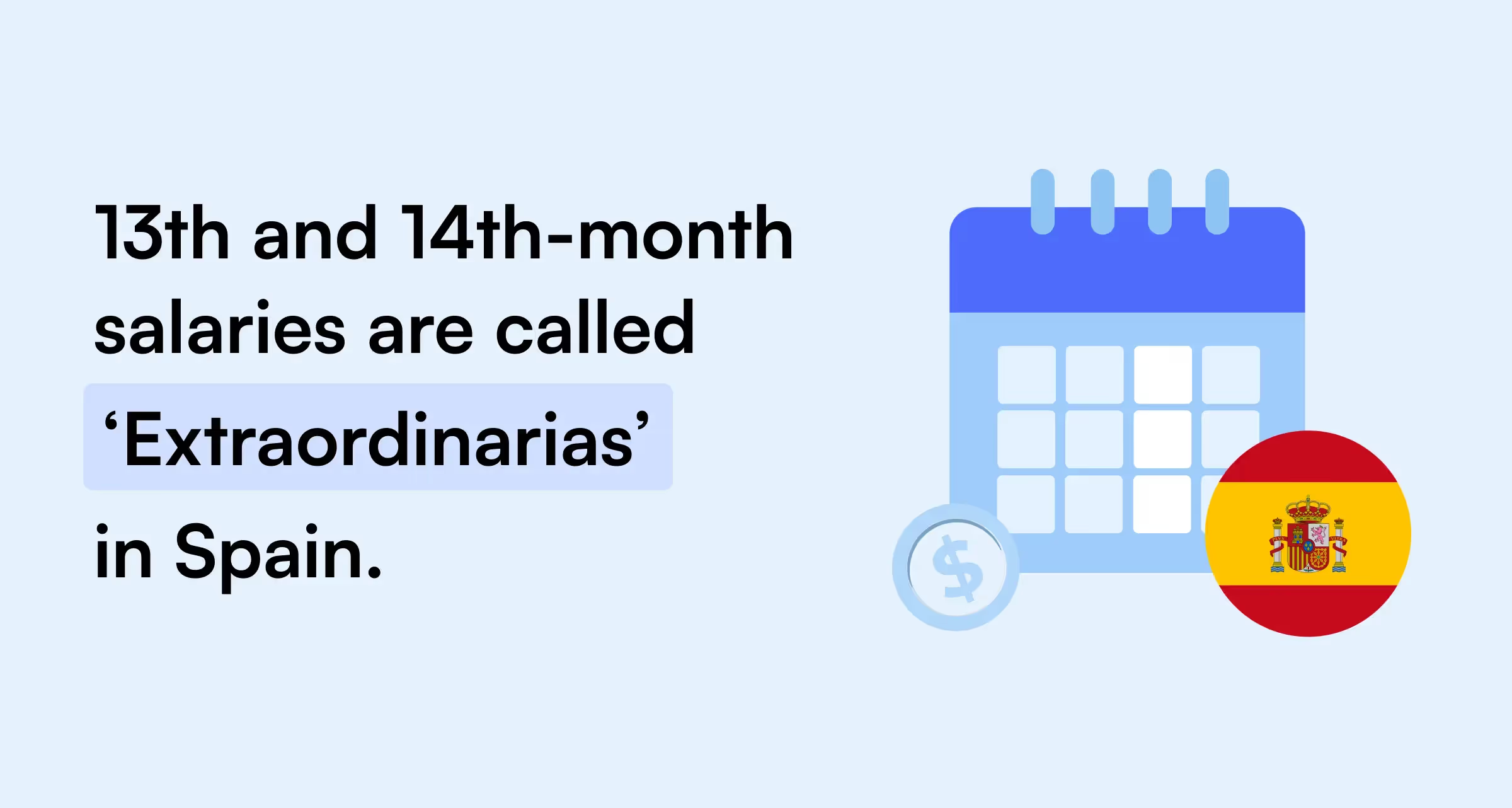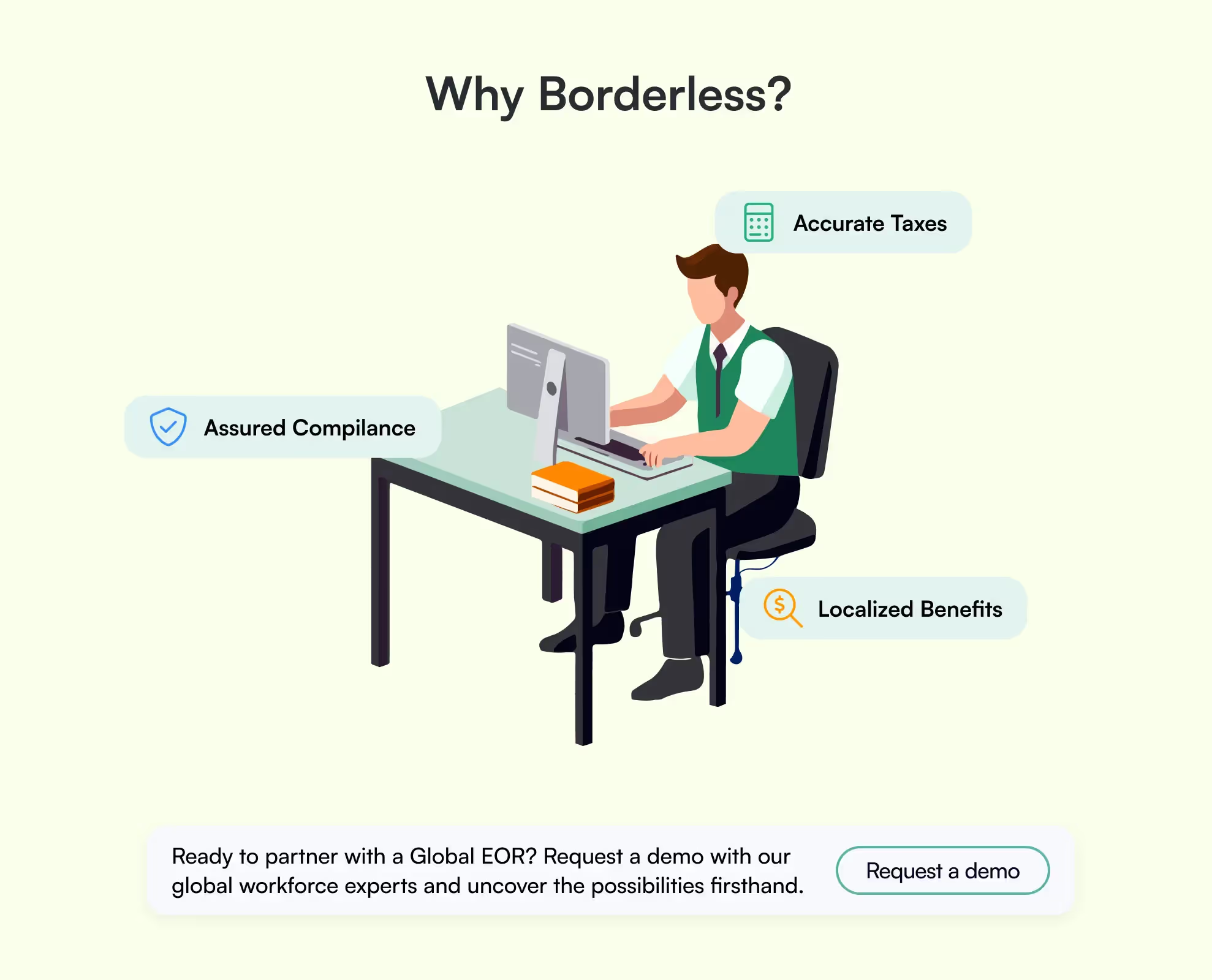In many countries around the world, employers are legally mandated and socially expected to provide their employees with bonuses.
These bonuses are commonly referred to as 13th or 14th-month salaries, as they typically equate to an extra month or two of compensation in addition to an employee's standard 12th-month salary. However, the specifics of these salaries differ around the world.
If you’re considering hiring global remote talent, it’s essential to have a solid understanding of what you’re legally required to provide your employees. It’s also helpful to understand their expectations so you can take care of your team.
In this article, we’ll dive deeper and find out which countries offer a 13th or 14th-month salary, how they approach them, and how to compute 13th month pay.
The 13th Month Pay
The 13th month's pay is generally paid at the end of the year as a way for employers to compensate their employees on top of their annual salary. The thirteenth month's pay is generally equivalent to a month's worth of salary. This provides additional financial aid to the employee during the holiday season, as it is usually paid out in December along with their regular salary for that month.
In some countries, the 13th and 14th-month pay are legal obligations that employers must fulfill, while in others, it is simply customary. Let's explore the various countries that have incorporated this compensation method into their system.

Latin and South America
Commonly referred to as ‘el Aguinaldo,’ 13th-month bonuses are a fixture in many Latin American countries and are required by law. Chile remains the only Latin American country with an Aguinaldo that's customary, and not legally mandated.
Argentina National labor law in Argentina requires employers to divide Aguinaldo into two installments. The first is to be paid by June 30th, and the second by December 18th. The amount that employees receive is contingent on an employee's highest monthly salary in the six months prior.
Bolivia
Aguinaldo in Bolivia is equivalent to one month's pay and is paid out at the end of the year. If Bolivia's GDP exceeds 4.50%, employers are required to pay employees to double their entitlement to Aguinaldo.
Brazil
Half of the Aguinaldo in Brazil is due by November 30th, and half by December 30th. In some cases, employees can receive a prorated Aguinaldo if their vacation falls between February and October. However, it’s up to the employee's discretion.
Chile
Chile is the only country in Latin America with a customary Aguinaldo, as opposed to a legally mandated one. However, employees who declare in writing that they will provide an Aguinaldo are required to honor their promise. It’s commonly divided into two installments, the first of which is paid in September and the second in December.
Colombia
In Colombia, employers are required to pay 50% of Aguinaldo in the first half of June, and the remaining 50% within the first twenty days of December.
Costa Rica
Aguinaldo in Costa Rica equates to the total basic salary of a month and must be paid within the first 20 days of December.
Dominican Republic
Employees in the Dominican Republic are entitled to one month's pay, to be paid by December 20.
Ecuador
Aguinaldo in Ecuador amounts to 15% of employers' profits, but cannot exceed 24 times the standard minimum wage. Employers are allowed to divide Aguinaldo into installments or pay it in a lump sum.
El Salvador
Seniority pays off in El Salvador - the amount of Aguinaldo that employees receive is determined by their years of service with an employer, who is required to pay it by December 20th.
Guatemala
Employees in Guatemala are entitled to receive both a 13th and a 14th-month bonus, which is commonly referred to as Bono 14. Each bonus equates to one month's salary. The 14th-month bonus is to be paid in July, and Aguinaldo is payable in December.
Honduras
Similar to Guatemala, Honduras also has a 13th and 14th-month bonus which are both equivalent to one month's salary. The 14th-month salary is due in July, and Aguinaldo is due in December.
Mexico
Employers are required to pay employees a minimum of 15 days' salary in Mexico, by December 20th. However, it’s common for employers to exceed this standard and pay one month's salary. Employers will also often split Aguinaldo into multiple payments.
Nicaragua
The deadline for Aguinaldo in Nicaragua is slightly earlier than most Latin American countries, falling on December 10th. Aguinaldo in Nicaragua is equivalent to one month's salary.
Panama
Panama stands out from the crowd, by requiring employers to pay Aguinaldo in three equal installments. The deadlines for payment are the 15th of April, August, and December.
Paraguay
Aguinaldo in Paraguay amounts to an employee's monthly salary and is payable by the end of December.
Peru
Peruvian employees are entitled to 13th and 14th-month salaries, which are both equivalent to one month's salary.
Uruguay
Aguinaldo in Uruguay equates to one month of pay and is divided into two installments. The first is payable in June and the second in December.
Venezuela
Employees in Venezuela are entitled to a 13-month salary, equivalent to one month's pay, due at year-end.

Europe
Paying employees 13th and 14th-month salaries in most European countries isn't bound by law. They’re a common practice that employees are accustomed to. However, it is ultimately up to the employer's discretion whether or not they wish to provide them.
Austria
Employers are required by law to provide both a 13th and 14th-month salary to employees in Austria, due in June and at the end of November.
Croatia
A 13th-month bonus isn’t legally mandated in Croatia, however, it is customarily provided.
Belgium
Most employees in Belgium are entitled to a 13th month bonus, which is typically paid at year-end. Many employers also offer to pay a portion of a 14th-month bonus, referred to as écule de vacances, which is commonly paid in the summer.
Finland
Though not required by law, a 13th month salary is expected in Finland, and typically paid before employees' annual vacation.
France
A 13th month bonus isn’t a statutory requirement in France, however, it is commonly provided to employees. It’s up to the discretion of employers whether to provide it annually in January or December or to spread it out in installments, which are typically paid in June and at the year-end.
Germany
Though employment regulations don’t mandate a 13th month bonus, many businesses opt to pay it at the end of the calendar year in Germany.
Greece
13th and 14th-month salaries are required by law in Greece and distributed over three months. The 13th month's salary is due at year-end, and the 14th month's salary is divided and paid around Easter and in the summer.
Italy
Italy’s 13th month salary, also known as tredicesima mensilità, is customarily paid in December. Some industries also receive a 14th-month salary, generally paid in July. Both bonuses are up to the discretion of the employer.
Luxembourg
It’s customary for employers in Luxembourg to pay their employees a 13th month bonus at the end of the year, equal to one month's salary. Employers will often also provide a 14th month's salary in the form of half a month's salary.
Netherlands
Though it’s not required by law, many employers in the Netherlands offer a 13th month salary equivalent to employees' monthly wage that is paid in December.
Portugal
Employment laws in Portugal stipulate that employers must pay both 13th and 14th-month salaries, which amounts to two additional months of salary. The 14th month's salary is due by the summer, and the 13th month is paid at Christmas.
Slovakia
In Slovakia, there is no legal requirement for employers to provide employees with a 13th or 14th-month bonus. However, they are customarily provided. The 13th month's salary is generally paid in the summer, and the 14th month's salary is paid around Christmas as a Christmas bonus.

Spain
Both 13th and 14th-month salaries, known as pagas extraordinarias, are mandatory in Spain. An employment contract or collective bargaining agreement stipulates when they’ll be paid. However, they’re typically paid in July and December.
Switzerland
A 13th month salary which equates to an employee's gross monthly pay is commonly offered in December to those working in Switzerland.
Belarus
Although it may not be required by law in Belarus, the 13th month salary is customarily provided to employees at the end of the year, and is often included in collective bargaining agreements.
Cyprus
A 13th month salary is not required by law in Cyprus. However, it is common for employment contracts to include them.
Lithuania
Although there is no legal requirement for s 13th month salary in Lithuania, it is typical for businesses to incentivize employees with a merit-based bonus.
.avif)
The Middle East
Performance-based bonuses are on the rise in the Middle East where 13th and 14th-month salaries are traditionally uncommon. Here are two countries that customarily pay 13th and 14th-month salaries in the Middle East!
Saudi Arabia
Though not legally required, a 13th month salary is commonly paid to employees on Eid al-Fitr in Saudi Arabia.
United Arab Emirates
It is also customary for employers to offer their employees both a 13th and 14th-month salary by year-end in the United Arab Emirates.
Africa
Similar to the Middle East, 13th and 14th-month bonuses are rare in Africa. Out of 54 countries in the vast continent, only Angola, Nigeria and South Africa are known to provide them.
Nigeria
A 13th month bonus isn’t legally mandated in Nigeria, however, it is commonly paid at year's end.
South Africa
Though not required by law in South Africa, a 13th month salary is often paid to employees in December.
Asia
Did you know that 13th month salaries originated in Asia? It became a part of Filipino law in 1975 in response to the widespread uproar over minimum wage. Since then, 13th month bonuses have spread throughout the continent.
China
Though not a formal regulation, 13th month salaries in China are often determined by employee performance and paid around Lunar New Year in the spring.
Hong Kong
13th month salaries are customarily issued to employees in December or before the Chinese New Year in Hong Kong.
India
India is one of three countries in Asia with a legally instituted 13th month salary. It’s paid to certain employees within eight months of the fiscal year's end.
Indonesia
Indonesia’s legally mandated 13th month salary, referred to as Tunjangan Hari Raya (THR), is generally paid one week before the religious holiday observed by an employee. Indonesia is known for its religious diversity. For this reason, the date of payment differs from employee to employee and is based on their individual preference. Typically, since the majority of the population is Muslim, the deadline for THR is during the end of Ramadan.
Japan
It’s an established practice for employers in Japan to pay 13th and 14th-month salaries in June and December.
Malaysia
It is customary for employers in Malaysia to pay a 13th month's salary at the end of the year.
The Philippines
The 13th month salary remains an important facet of Philippine employment law. All private-sector employees who have worked for at least one month are entitled to receive an additional month of salary before December 24th. Some employees also receive a 14th-month salary, however, it’s not required by the employment law.
Singapore
It’s common practice for employers in Singapore to provide employees with a 13th month salary, referred to as an Annual Wage Supplement (AWS). The amount employees receive depends on their employer's overall performance and is viewed as a reward for positive contribution.
Taiwan
Though they’re not legally mandated, 13th and 14th-month salaries are typically distributed around the Lunar New Year in Taiwan.
Vietnam
Employees who have worked with an employer for more than one year are often provided with a 13th month salary around Lunar New Year or before the year-end in Vietnam.
.avif)
How to Compute 13th Month Pay For Rank and File Employees?
While each county has its own 13th month pay computation formula, there are a few common methods to calculate the 13th month pay for an employee.
For some countries, employers divide the employee’s annual salary by twelve to arrive at an amount for the 13th month pay. For example, if an employee makes $10,000 annually, then 10,000 is divided by 12. This means $833.33 is the amount the employee will take home as a part of their 13th month pay. It is important to note that in most cases the annual salary does not include any additional bonuses or monetary benefits that the employee might have received throughout the year.
In some cases the base annual salary is divided by 13. For example, if an employee contract states that the employee will be paid $10,000 annually, then that number is divided by 13. This results in the employee being paid $769.23 each month, and during the last month, they are paid $1538.46.
13th month pay is calculated through various other methods, such as a percentage of the annual income.
Who is Eligible for Receiving a 13th and 14th Month Pay?
Each region and country has their own requirements for who is eligible to receive a 13th and 14th month pay. However, most countries provide this benefit to those employees who have worked at least one month or more. From temporary employees, probationary employees, permanent employees, full-time employees, contract workers personal service employees, and government employees, everyone has the opportunity to receive this additional compensation regardless of their employment status. However, since this is not a government-mandated employee benefit, employee eligibility can vary depending on the country. 13th and 14th month payments are not a legal requirement in most countries, this means the employer can negotiate and decide which type of worker will receive this additional pay.

Borderless Has Your Back
Hiring global remote talent can feel overwhelming – that’s why we’re here. Borderless offers Global EOR platform that will help you maintain 100% compliance and provide your team with exactly what they’re entitled to.
Whether you are looking to grow your team, engage with talented professionals or simply want to expand to a bigger market, Borderless can assist you in maintaining compliance in over 170 countries.
Now you can on-board, manage, and pay your international team while remaining compliant with local labor laws thanks to Borderless’ all-in-one platform solution.
Speak with our team today and find out how we can assist!
Disclaimer: Borderless does not provide legal services or legal advice to anyone. This includes customers, contractors, employees, partners, and the general public. We are not lawyers or paralegals. Please read our full disclaimer here.

.png)



.png)



